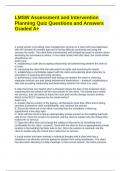Exam (elaborations)
LMSW Assessment and Intervention Planning Quiz Questions and Answers Graded A+
- Course
- Institution
LMSW Assessment and Intervention Planning Quiz Questions and Answers Graded A+ A social worker is providing case management services to a client who was diagnosed with HIV disease six months ago and is having difficulty accessing and using the services he needs. The client feels overwhelmed and is...
[Show more]



